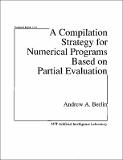A Compilation Strategy for Numerical Programs Based on Partial Evaluation
| dc.contributor.author | Berlin, Andrew A. | en_US |
| dc.date.accessioned | 2004-10-20T20:12:09Z | |
| dc.date.available | 2004-10-20T20:12:09Z | |
| dc.date.issued | 1989-02-01 | en_US |
| dc.identifier.other | AITR-1144 | en_US |
| dc.identifier.uri | http://hdl.handle.net/1721.1/6981 | |
| dc.description.abstract | This work demonstrates how partial evaluation can be put to practical use in the domain of high-performance numerical computation. I have developed a technique for performing partial evaluation by using placeholders to propagate intermediate results. For an important class of numerical programs, a compiler based on this technique improves performance by an order of magnitude over conventional compilation techniques. I show that by eliminating inherently sequential data-structure references, partial evaluation exposes the low-level parallelism inherent in a computation. I have implemented several parallel scheduling and analysis programs that study the tradeoffs involved in the design of an architecture that can effectively utilize this parallelism. I present these results using the 9- body gravitational attraction problem as an example. | en_US |
| dc.format.extent | 7397665 bytes | |
| dc.format.extent | 2736044 bytes | |
| dc.format.mimetype | application/postscript | |
| dc.format.mimetype | application/pdf | |
| dc.language.iso | en_US | |
| dc.relation.ispartofseries | AITR-1144 | en_US |
| dc.title | A Compilation Strategy for Numerical Programs Based on Partial Evaluation | en_US |
